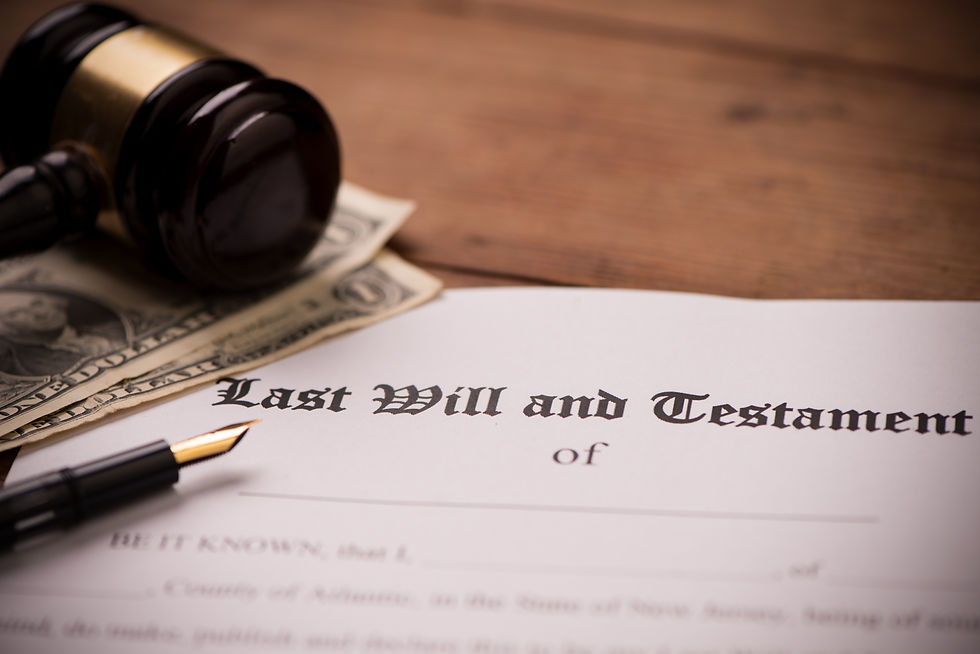How to Hold Title to Property
- Olivia Scuderi
- Oct 21, 2025
- 4 min read
Updated: Feb 1

This is not a substitute for legal advice. See here for the site’s reposting policy
Introduction:
Many farmers own their property with their spouse in a tenancy by the entirety. The manner in which property is titled will determine the ease with which each partner can transfer their interest in the property. Assets with this form of the title will pass automatically to the remaining living spouse, and only one-half of the value of the property will be subject to federal estate taxes. However, other forms of co-ownership exist for those that are not married such as joint tenancy and tenancy in common and individuals who do not co-own property.
One question for a professional estate tax attorney or accountant is: What is the most beneficial way to own the property in order to pass on the business? For more information on property ownership see, Property Ownership and Transferring Are Important Features of Your Farm Succession Plan (UME FS-1056, 2017) and the chart below for guidance on forms of co-ownership.
Table 1: Forms of Co-Ownership
Type | Definition | Example |
Joint Tenancy | Tenants have an undivided interest in the property and right of survivorship | |
Tenancy by the Entirety (Married Farmers) |
| John and Mary, a married couple in Maryland, jointly own a residence. Therefore, Mary automatically becomes the sole owner of the property when John passes away. |
Tenants in Common |
| After their parents pass away, Caleb and Jasmine, siblings, inherit a Baltimore row house as tenants in common. Each owns 50% and is responsible for taxes. One wants to sell their share, but the other prefers to keep the property and rent it out. The brothers may go to court seeking a partition action, which could require the property to be sold. |
Table 2: Individual Legal Interest Forms: Fee Simple Absolute, Life Estate, Term of Years Leasehold
Feature | Fee Simple Absolute | Life Estate | Term of Years Leasehold |
Definition | Full ownership of land with no time limit | Right to use land for your lifetime | Right to use land for a fixed period (e.g., 10 years) |
Ownership Duration | Permanent; lasts forever | Ends at death of life tenant | Ends at expiration of lease term |
Who Inherits/Receives Next? | Owner decides via will or deed | Goes to remainderman (whoever is designated next in line) after death | Reverts to landowner at lease end |
Can It Be Sold or Gifted? | ✅ Yes – can sell, gift, or leave by will | ⚠️ Limited – can sell life interest, but only for duration of life | ❌ No – lease can be assigned or sublet if allowed, but not sold |
Right to Use and Farm? | ✅ Full rights to farm, rent, or build | ✅ Can use and farm during lifetime | ✅ Use allowed under lease terms |
Obligation for Upkeep? | ✅ Yes – responsible for all taxes and maintenance | ✅ Yes – must maintain property (can’t devalue it) | ⚠️ Usually yes – depends on lease agreement |
Control Over Future Use | ✅ Full control | ❌ No control after death | ❌ No control beyond lease term |
Common Use in Ag Settings | Owning family farmland long-term | Passing land to heirs while retaining right to live/farm | Renting land for crop or livestock production |
Probate Involvement? | ✅ Yes, unless transferred by deed or trust | ⚠️ Life estate ends at death, remainder may pass outside probate | ✅ Lease ends automatically; no probate |
Glossary:
Fee Simple Absolute - The most complete form of property ownership, granting the owner full rights to use, sell, gift, or bequeath the land with no time limit. The property remains in the owner's control unless transferred.
Joint Tenancy - A form of co-ownership where each tenant has an undivided interest in the property with right of survivorship—if one owner dies, their share automatically passes to the other joint tenant(s).
Life Estate - A form of ownership allowing one to use and benefit from property for the duration of their life. Upon death, ownership passes to a remainderman (the next designated owner). The life tenant cannot control future ownership beyond their lifetime.
Remainderman - The person or entity designated to inherit property after a life estate ends.
Tenancy by the Entirety - A type of joint ownership available only to married couples, treating them as a single legal entity. Ownership includes right of survivorship, and neither spouse can transfer interest without the other’s consent.
Tenants in Common - A form of co-ownership where each person owns a distinct share of the property. Shares can be unequal and freely transferred or inherited. No right of survivorship exists—each share passes according to the owner's will.
Term of Years Leasehold - A lease granting use of land for a fixed period of time (e.g., 10 years). The leaseholder has no ownership and limited control. At lease expiration, the land reverts to the owner.
Undivided Interest - Ownership concept meaning each co-owner has an equal right to use the entire property, even if ownership shares are unequal.
Right of Survivorship - A legal mechanism in joint ownership where a deceased owner's share automatically passes to the surviving co-owner(s), bypassing probate.
Partition Action - A legal action used to resolve disputes between co-owners, often resulting in the division or sale of the property under court order.
References:
Paul Goeringer, Property Ownership and Transferring Are Important Features of Your Farm Succession Plan, Farm Succession Planning (Feb. 28, 2017), https://medium.com/farm-succession-planning/property-ownership-and-transferring-are-important-features-of-your-farm-succession-plan-57a3b086e580.
This work is supported by the Northeast Extension Risk Management project award no. 2024-70027-42540, from the U.S. Department of Agriculture’s National Institute of Food and Agriculture.




Comments